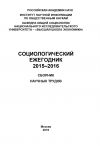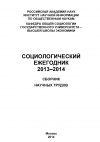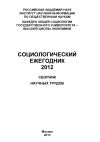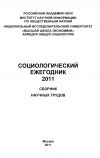Текст книги "Социологический ежегодник 2010"

Автор книги: Коллектив авторов
Жанр: Социология, Наука и Образование
сообщить о неприемлемом содержимом
Текущая страница: 37 (всего у книги 39 страниц)
* * *
Q: Can sociologists exist in countries which don’t have civil society? What do you think about civil society in Russia?
MB: As I see it sociology is a view of the world taken from the standpoint of civil society, so if there is no civil society there is no sociology. And I think there is a lot of evidence for that – in Stalinist Russia there was no sociology, in Mao’s China there was no sociology, and there was no civil society in either of those countries. The same happened in Pinochet’s Chile, or in Nazi Germany. Without civil society sociology cannot survive, they are connected by an umbilical cord. They are Siamese twins, firmly attached to one another, growing up together.
I think what we sociologists have failed to do is to develop a convincing scheme of mapping civil societies in different parts of the world. Any such map must also show the relationship between civil society and the state, civil society and the economy at the same time as being sensitive to the internal structure of civil society. What is civil society? Its elements are institutions, organizations, social movements and publics that are neither part of the state not part of the economy. What does it look like in Russia? It looks very different in Moscow than it does in Syktyvkar; Novosibirsk is different from Saint Petersburg. Russia is an enormous country and I think the first thing to say is that Russian civil society is not a single integrated one, it is a fractured civil society and therefore you get a fractured sociology. It is no accident, therefore, that sociology tends to develop in one or two centers in Russia. I have not been studying Russia since 2002 so I don’t have a good sense of what has happened since then in terms of the development for example of social movements or organizations that transcend regional boundaries.
NP: I agree with you again. Sociology is fragmented and, in my opinion, civil society today in this part of the world is not living through its happiest times. The public demand for sociology is falling as compared to what it used to be, let’s say 5–8 years ago. We probably need to agitate publics, this is why we have invited our students to study public sociology, because we cannot wait to be asked to do something in society, we need to look for work in society, to recruit more publics to study sociology, to take the initiative in meeting people, in going on television and radio, the press so as to convey analysis, our critical evaluation of what is happening in society. This is what we can and should do – there is some room for that, there is a freedom today to do that. In other words we need to be a little bit more militant.
MB: Absolutely. On the one hand, there is the idea of a traditional public sociology in which you communicate sociological visions and their relevance through the mass media. On the other hand, there is the organic public sociology in which you have direct face-to-face unmediated relationships between sociologists and communities, building up projects and researches through collaboration.
Sociology has its own projects but it cannot be isolated from other disciplines. Particularly in public sociology, we have to collaborate across disciplinary boundaries. That is not to say that we dissolve sociology, it means that we strengthen the discipline by having relationships with other disciplines. I think public sociology must become a part, a distinct part of a public social science.
Some people think that there should be only one social science, that there should not be sociology, political science, geography, anthropology or economics but instead just one social science. This one social science at this time in history would turn out to be economics and that would be problematic, at least from my point of view. Social sciences have different interests: although each social science is a complex and contested field, nevertheless each has a dominant perspective: in political science it is to support the stability of political orders, in economics it is to expand markets. As I’ve said I think sociology’s interest is to defend civil society and I think these are antagonistic projects. Particularly in an era of run-away marketization, sociology has a very important role to play – to keep markets and the state at bay, to prevent them from destroying civil society. In this regard sociology is at odds with the dominant perspectives in economics and political science, but it is allied to anthropology and to geography. I suppose I am a «sociological chauvinist» – I still believe in the importance of a sociological vision. And as I say this is very much tied to civil society.
Q: Can one be a sociologist without having a credentialed official training as a sociologist?
MB: I don’t think there is any doubt that one can be a public sociologist without a diploma in sociology. In this country, there are thousands of journalists, many of whom are spontaneous, intuitive sociologists or even sociologists that have read a lot of sociology. There are quite a few outstanding journalists who write brilliant analyses of important issues of a sociological character. The New Yorker is particularly strong in this regard, and the New York Times is like a daily journal of sociology!
So, yes, there are public sociologists doing good work, who are not part of a university, who may not even be trained in sociology and it is our role, sociologists in the university, to enter into a dialogue, a discussion with them. When I was a president of the American Sociological Association, I introduced a new award for excellence in the reporting of social issues. The idea was to reward and recognize people outside the discipline who are doing good sociology, and that is what we do every year. We should not see them as competitors but as collaborators and we should learn from them.
Q: What type of knowledge and practical skills are important in training a public sociologist?
MB: There are two types of public sociology, traditional and organic, and they require very different skills. The traditional public sociologist has to be very skilled at translating – they both have to be of course – sociological ideas into an accessible language so that they resonate with the experience of those with whom we are communicating. Training to be an ethnographer who joins communities in their time and space would be good training for all forms of public sociology. Before we can communicate sociology, we have to understand the common sense of the people with whom we are communicating. That is a necessary foundation for both the organic and the traditional type of public sociology.
In training public sociologists, we should also spend much more time listening to journalists talk about how they communicate and write for public audiences – they do it every day of their lives. We should bring in photographers and see how they think and how they imagine their subjects. We should bring in practitioners of communication and become apprentices to such experts.
Sociology has not done enough to explore different media; anthropologists are way ahead of us. If we are a part of sociology, we should very deeply engage with, for example, film as a way of presenting our ideas. There are all sorts of ways of presenting our ideas through the Internet, just like the very conversation we are having today. We should be doing more of this. A friend of mine, Erik Wright, who teaches in Wisconsin holds conversations between himself and political activists in Bogata, Columbia, about his ideas on participatory government and democratic budgeting. This trans-continental dialogue is now facilitated by the communications technology that we have. That is the optimistic side of public sociology – we have at our disposal new technologies that would facilitate getting our ideas across.
Q: On the one hand, sociologists should work with concrete publics that exist in reality. On the other hand, public sociologists should create and organize their own public. What do you think about sociologists themselves constituting a public?
MB: One of my projects in the International Sociological Association has been to create a global community of sociologists. We have to learn to talk to ourselves and among ourselves, to constitute ourselves as a public before we can be effective in communicating with others. Or at least these two should go hand in hand. We are simultaneously observers of society but also participants in society. As observers we constitute ourselves as scientists, professional sociologists, but as participants we constitute ourselves as public sociologists. I feel strongly that we have to think of ourselves as a collective actor and we have to turn sociology on ourselves and think imaginatively how we can work together across national boundaries, overcoming all the inequalities and differences that divide us. It is a difficult project particularly especially if we are thinking globally, but I am encouraged that this is really possible – to develop a distinctive vision of sociology that we can indeed all share.
Гражданская сфера vs публичная сфера / Телемост с Джеффри Александером
Civil sphere vs public sphere / Telebridge with Jeffrey Alexander; Higher school of economics (Moscow, Russia) – Yale university (New Haven, USA), 10 February 2010
Джеффри Александер (род. 1945)
Один из бесспорных лидеров современной социологии, профессор Йельского университета, заслуженный профессор Калифорнийского университета в Лос-Анджелесе, совместно с Р. Айерманом возглавляет Центр культурной социологии Йельского университета. Представитель неофункционализма (термин «неофункционализм» был введен в научный оборот им самим в 1985 г.). Учитывая критику функционализма 1960– 1970-х годов, дополнил концепцию Т. Парсонса достижениями других социологических школ, прежде всего идеями, связанными с конфликтом и феноменологией. Среди последних работ Александера: «Значения социальной жизни: Культурная социология» (2003), «Гражданская сфера» (2006).
Participants
JA – Jeffrey Alexander, Yale University
NP – Nikita Pokrovsky, HSE
AB – Alex Boklin, HSE
DP – Dmitry Popov, HSE
SL – Sergei Lebedev, Moscow State University
JA: I would start with some background introduction to my work on the civil sphere. «The civil sphere» draws out of different trends of my work but what is most distinctive about it is its cultural sociological dimension.
Cultural sociology is something that I began to define in my own particular manner in the middle and late 1980s. This is an effort to put meaning, pat-terns of meaning and meaning-making at the center of social science, to make meaning into an independent variable to give culture relative autonomy.
The background of this goes back to Durkheim. In the early 1980s I said that we needed to make a distinction between the middle theory of Durkheim and late Durkheim. Late Durkheim is especially in «The elementary forms of the religious life», which is a study of the symbolic classification system of the Australian aborigines, the rituals, the division of symbols into the sacred and profane, the energy that circulates among the aborigines, and the importance of culture. That book by Durkheim, published in 1912, was taken as a foundational text for anthropology but not sociology. Sociology focused on «The division of labour in society» (1893), «Suicide» (1897) and «The rules of the sociological method» (1895). My interpretation of Durkheim was that those middle period works of the 1890s were too functionalist and too mechanical; it was really Durkheim toward the end of his life who emphasized symbolic and emotional energy which we should focus on.
In doing so, I wanted to argue against the idea that traditional and modern lives are radically different in terms of the role of emotions, tradition, and meanings. This is one of the most pernicious divides that marks modern social science. Of course, there is a big difference between a traditional and a modern society, there is no doubt about the role of science, urbanism, education, rationality etc, but does that mean that modern people have given up irrational feelings and commitments to belief systems that can’t be proven by science? The assumption of Marx, Weber, early Durkheim, also Simmel in many respects, and many others since is that there is this radical break between tradition and modernity: for example, when anthropologists study traditional societies, they might use the tools of symbolic analysis, but when they study modern societies, they have to focus entirely on the economic organization, on the role of demographic variables, on society as purely bureaucratic.
In the 1980s, I tried to develop conceptual tools for studying culture, meaning, codes and narratives inside the modern societies. For instance, I wrote an article on the computer, «The sacred and profane information machine» which is in a book called «The meanings of social life: A cultural sociology». I said that the computer is, of course, a piece of immensely efficient and rational technology, but it is also a gigantic symbol that people have very irrational feelings about; they look to the computer as a vehicle of salvation and a machine that threatens damnation, that threatens to bring an apocalyptic end of the world.
In the late 1980s I was studying politics, in which I have always been interested, and wrote an essay on the Watergate crisis in the US, which was created by president Nixon. One of the things I realized, as I was beginning to learn about symbolic structures, is that late Durkheim has to be updated and connected to semiotic theories – for example, Barthes, Lévi-Strauss, later on Foucault and also to the hermeneutical theories of Dilthey and others, and – in the contemporary context – to the great symbolic anthropology of the late 20th century – for example, Mary Douglas, Clifford Geertz, and Victor Turner. So basically my concern as a cultural sociologist was to synthesize these different elements in a way that would produce models of analysis that could be subjected to rational empirical methods and come up with strong and robust findings.
In the late 1980s and 1990s, I studied the history and contemporary contours of political, social, economic, governmental, racial, gender, religious conflicts that occur in the public sphere of the United States particularly, but other countries as well. And instead of thinking of those conflicts as conflicts primarily over the material resources or social capital (such that the actors had nothing in common with each other – in other words, a game theoretical model), it seemed more true to me that the actors often actually spoke a common language. Even while they were in a very serious conflict with each other, they articulated their different interests in terms of a shared public language of which they were not really aware. I decipher this language as a binary code which I call «the discourse of civil society». I decided that was the language about motives, relations and institutions that had highly polarized quality of the sacred and profane, good and bad, and that what people were fighting over was not only material interest but the symbolic construction of themselves and others and that if they could construct their opponents in a polluted manner then those would look to the public audience as if they were undeserving of opposition in the civil sphere and were not worthy people in civil terms.
Once I had that insight, I built a new theory of the civil sphere and in doing that I could take on board not only cultural theories, but also institutional theories which were a bit of Durkheim, partly Weber, a lot of Parsons. Weber and Parsons developed a theory of different value spheres and different institutional worlds, and they develop a basic notion of systems – so you could talk about the relative autonomy of different spheres (civil, political, sphere, family, religious, ethnic or racial) from each other. It seemed to me that I could develop a more sociological understanding of democracy – that democracy exists to the degree that civil sphere assumes relative independence from other spheres. And I define the civil sphere as a sphere organized around an ideal of solidarity where each person has strong feelings of identification with every other member of the society, but the identification with people defined as autonomous individuals. So it is an attempt to combine individual with the communal and this is quite close to Durkheim’s understanding of «the cult of the individual» or to what Parsons called «institutionalized individualism».
I don’t believe that civil solidarity has been given nearly enough attention in social theory or in social sciences. Social sciences have mainly talked about the nation, the state, a bit about the legal order, of course, economic inequality a lot, ethnicity etc, but the sphere of civil solidarity is rarely the object of social analysis, so my aim was to develop a new object of study. What I wanted to lay out was, in a kind of Mertonian way, a middle range theory of the civil sphere, not simply a meta-theory in a philosophical or normative sense of which Habermas’ work «The structural transformation of the public sphere» is an example. But my aim was very sociological – I wanted to elaborate a set of concepts which would enable people to do research and to develop explanations.
I have two main levels: the level of the discourse of civil society which I have described in a set of complex languages and then the institutional level which I divide into the communicative and the regulative. The communicative gives a central role for mass communication, for public opinion polling, and for civil associations, and the regulative has more to do with using the discourse of civil society to develop coercive instructions to the state and to the individuals in the society. Of course, the key to a democracy is if the people on their own can regulate state power. That is the critical issue, because if they can do that to a significant degree, then they can also regulate economic, religious or patriarchal power. For example, if you have a relatively autonomous mass media, that is tremendously significant in affecting public opinion and social consciousness, and people who are in power have to answer to this public opinion. That is why when a society moves away from democracy, it is extremely important for authoritarian powers to gradually gain control of newspapers and television stations and why professional journalism is one of the least studied but most significant institutions in a civil society.
It is a shame – I don’t know what it is like in Russia but in the United States – the study of mass media is in specialized schools that are called «media schools» or «journalism schools» and it is rarely a part of the social science – sociologists rarely study newspapers or televisions. Anyway, the communicative institutions are critical – another example is polls. The more a society becomes authoritarian the less is public polling important. Polls seem as if they are purely scientific – they take random sampling to develop public opinion, but polling provides a public force that can shock people in a moral manner – for instance, it can say that the public doesn’t like what the president of the United States is doing. If Obama is doing something and people think it is popular, and then public opinion polls reveal that actually there is skepticism among the majority of citizen about President Obama’s health care plan – well that kind of stops him! There is no institutional regulation, but then the journalists say: «How do you respond to the fact that the public doesn’t like what you are doing?» and he feels compelled to answer in a way because he is under obligation of solidarity. Of course he is also worried for his own material interest and that gets to the regulatory institutions, because every one, two, three or four years there are elections. The electoral system (free and fair voting) is a critical regulation: every once in a while public opinion translates into a vote which means that people can be kicked out of the office.
* * *
One of the things that I struggle with in developing this theory is the relationship between civil sphere and public sphere – there is a mess with the terms and I address this when I talk about the civil society. In the literature you must have met mostly civil society; I wanted to try to develop a distinctive way of speaking of civil society as a sphere that is vis-а-vis other social spheres whereas the traditional political theory and social theory way of thinking about civil society is all spheres outside of the state or all social issues outside of the state. For me, the civil sphere is different than the public sphere; many of the performances in the public sphere are oriented towards the extensions or contractions of civil society and civil obligations, but many are not. This is the argument that I have made.
The Habermasean perspective, which is very powerful today, traces its roots back to Plato and Aristotle and the ideas of Socrates – back to the Greek polis in republican Greece. «Publicness is identical with democracy» – that is Habermas’ argument. I don’t agree with that because what I see is that publicness is a performative space in which people – political actors, social actors – can make arguments against democracy that can be projected to everybody. In the 1920s and early 1930s in Germany, the Hitler movement and the Nazi movement performed on the public stage as very effective actors and increased anti-Semitism, nationalism and eventually succeeded in gaining the most votes in 1933! And in the United States I see many very conservative actors making effective performances on the public stage.
Hannah Arendt is very interested in the public as well and she also, as Habermas does, takes her interest back to the Greek polis and to the classical writings of the ancient philosophers. But Arendt has a much more cultural and symbolic understanding of the public sphere. Habermas’ understanding of the public sphere is very rationalistic: he believes that people are compelled to present good reasons, that there is an urge to reach consensus, that you are bound by certain norms of transparency etc, whereas Arendt realizes that the public sphere is a sphere of what she calls «agonism» and she uses the notion of performativity – the sphere of speaking and acting individuals. I feel that my understanding of the public sphere is closer to Arendt’s.
In the last decade, I have tried to develop a theory of social performances. Social performances are ways that actors try to get results in interaction, but they do so culturally and symbolically, not through rational action. The idea of social performance tries to embrace a more pragmatic dimension and connect it to a cultural dimension – that is why I call it a theory of cultural pragmatics. If you look at the history of post–World War II sociology you see the work of Erving Goffman and his first and most important book «The presentation of self in everyday life» published in 1956. It is all about presentation, performativity, and there are a lot of other developments like the work of John Austin with the notions of ordinary language and performance. So I try to bring theater studies, performance studies into cultural theory.
* * *
AB: My question will generally refer to the relation between the civil sphere and Internet technologies. We may point out quite a number of negative intrusions that can be made into civil sphere – by capitalism, by state, by religion etc. But as far as I understand there is at least one danger that comes from within – this is the problem of commercialization or bureaucratization of civil sphere. If we take what is called «independent mass media» or trade unions fighting for workers’ rights, they all imply inequality within their organization (including unequal distribution of power), they all need some funds in order to keep on existing. And this may turn to noncivil institutions which demonstrate these features. So the question is: how would you evaluate the potential and the role of Internet technologies – in particular Wikipedia which helps to share information for free and can be contributed to freely, or Youtube which was the only channel for information from Iran when all other media were blocked by authorities after the election, or social networks like Facebook? I suppose, these could be really useful instruments for constructing and sustaining civil sphere.
JA: Concerning the first point about commercialism, I would say that spheres outside of the civil sphere including economic and private capitalism are not necessarily anticivil, but they are noncivil. I identify three ideal-typical modes of relation between civil and noncivil: facilitating input, destructive intrusion and civil repair. I argue there it is up to the society at particular time to decide if something is a destructive intrusion or not – in other words, whether it is anticivil. It is not objectively anticivil: for example, the patriarchal arrangements of a traditional family where a male was in power over the female was not regarded as an anticivil institution for most of modern societies. If you look at Habermas’ book, he actually argues that patriarchal family was essential to the vigorous public sphere and ethics, but in our days – at least insofar as we accept feminism as a strong moral argument – we often feel that that family was anticivil, that it does not give facilitating inputs to the civil sphere, but is something that the civil sphere needs to reconstruct to give more rights to women so to protect them.
I would say, the same is with business. The history of the relations of private capitalism and the civil sphere is always changing and always dynamic. For example, the safety and the conditions of workers in factory, which are fairly regulated now, used to be unregulated. Is there unemployment insurance for people when they are fired? Is there right for workers to organize their own trade unions? These are continually negotiated.
The issue of independent media is also very important. On the one hand, the media is made for the purpose of making profit and one would say this is anticivil. But I would argue that that it really depends more on the profession of journalism – to what degree does it form a self-regulating professional organization – and the freedom of the people who write the scripts and the news. How much do they control? How much do the people who own the media control? These are big issues to study.
The second part of your question that was about all the new, let’s say, «social relations media». Definitely in a society which is very state-controlled, where there is a suppression of the autonomy of media, you find that these social networking tools are absolutely essential because they are the only way people can communicate directly with one another and public opinion can form, and broader solidarity constructed. In a society like the Unites States, however, networking media do are not as crucial, for there are other, more professional, and more deeply institutionalized communicative institutions in the civil sphere.
It is quite a challenging problem, for example, to figure out what the relationship is of blogging to the communicative media of the civil sphere. If you look at the blogging you see blogs are very partisan and very «prejudiced». Blogs are organized nationally around right wing and left wing opinions; they don’t correspond to the utopian ideology or the utopian discourse of the Internet. As a cultural sociologist I would look at the Internet not as an objective thing (although it does have objective possibilities), but there has also been a utopian discourse in a company of the introduction of the Internet – a utopian discourse of freedom, solidarity, democracy.
For example, people say: «The Chinese government will not be able to maintain its authoritarian control once that Internet comes to China» as if a purely technological development has a gigantic cultural meaning attached to it, and thus its effects are inevitable. But as we see in China, the Internet will be controlled to a high degree by the state and we experienced a tremendous conflict between Google and the Chinese Communist Party. As I understand, in Russia it is not like that and there is still complete freedom of the Internet use. All of these social networking technologies are a new kind of communicative institution and they should be written about, but in a manner that is careful not to endorse them as an inherently democratic institution.
SL: I would like to bring up again the topic of mass media and communication. Could you please expand on how they produce ideology, myths and in this way influence society and act as a means of power?
JA: In the United States and Europe there has been a very long standing debate about the relationship between mass media and mass public opinion. Basically, there are two very well established standpoints – one is that the mass media is a manipulator of opinion, independently of society, but the other side of research says that is not true, that ideologies or narratives of the mass media are filtered through the primary and secondary groups of the civil society. Projection and reception may be not synchronized, and you can have a state mass media projecting things which people just do not believe. Of course, when the mass media are controlled not by the civil society but by the state or by a rapacious capitalist and are not affected by independent journalism, they are an anticivil force – but it does not mean that they have complete control of what people think; there are other ways for people to form opinion. Even in the darkest days of the Soviet Union, from my observation, it was not clear that the mass of the people believed the propaganda machine of the state, and there were independent circulations of opinions, there were artists, there were intellectuals.
Правообладателям!
Это произведение, предположительно, находится в статусе 'public domain'. Если это не так и размещение материала нарушает чьи-либо права, то сообщите нам об этом.








































